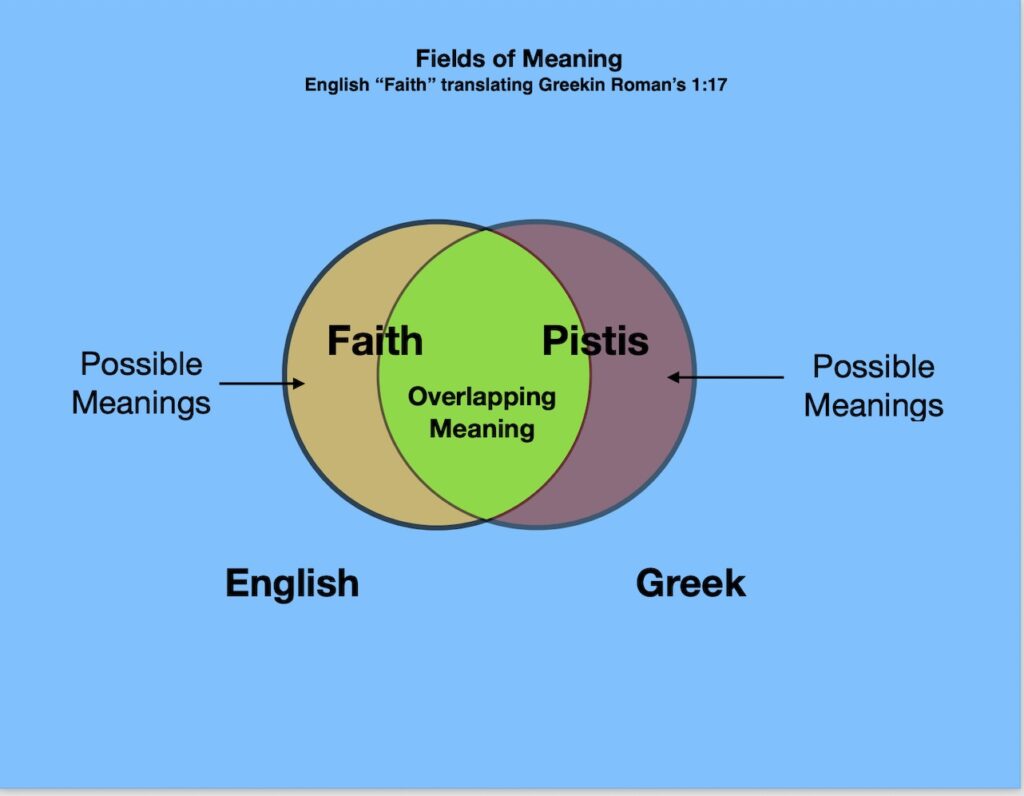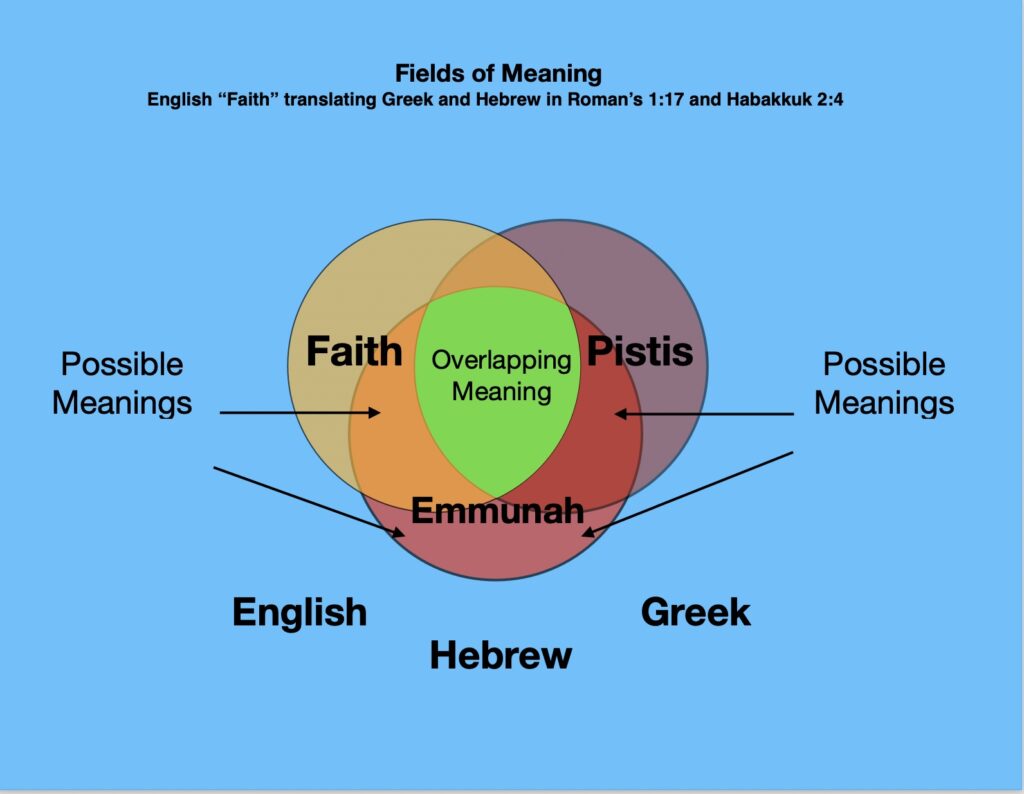Why Simple Bible Words Aren’t Simple
Word Meanings Change Over Time
A mistake that many Bible teachers make is to base their understanding on the definitions of English words in the text. The reason this isn’t helpful is that words in all languages often acquire new shades of meaning over time. Think of the words “gay,” or “woke” or “progressive” for instance. Additionally overused words like “do” or “make” or even “love” start to mean everything and nothing. Good Bible teachers know that the word “love” has to be carefully defined so as not to confuse it with unbiblical ideas. But more importantly, when we translate from one language to another, there is almost never an exact equivalent word in the new language.
Word Meanings From Two Languages Only Overlap
Take the English word “faith.” The chart below represents how the meaning “overlaps” and how it “diverges” from the Greek word pistis which can be translated “faith.” These words overlap in meaning, but they are not exact. Not all the shades of meaning are the same in both. And translators are interpreting when they pick the shade of meaning to express.

This is further complicated in Romans 1:17. The Apostle Paul uses the Greek word “pistis” to translate the Hebrew word “emmunah” from Habakkuk 2:4. Now we have three “overlapping” meanings and three “possible” meanings. If we take the dictionary definition of the English word “faith” as our only source of understanding we risk erring in our understanding.

The problem is the “overlapping” meaning is not all the possible meanings and may not be Paul’s intended meaning. We need to see how a first century Jew, like Paul, most likely would have understood the word not how John Calvin or Martin Luther or whoever thought it meant. Famous theologians were smart and studied people but their writings are not the God-Breathed text and were sometimes tainted by the desire to win an argument. We must begin with the Bible as our authority and hold our theology up to its light not the other way around.
How We Might Proceed in Understanding Romans 1:17
- Look the passage up in a literal translation like King James Version or on an online Greek Interlinear tool. They are easy to find and easy to use. We are trying to eliminate the translator’s interpretations. In Romans 1:17, it literally reads: “For in it (the gospel) the righteousness of God is revealed from faith to faith, just as it is written, the righteous shall live by faith.” (NIV translates this “by faith, from first to last” trying to make sense of the phrase, but this is unnecessary as we shall see.) For faith, Paul uses forms of the Greek word “pistis.”
- If, as in this passage, the New Testament writer is quoting the Old Testament, look up the Old Testament passage in its most literal. Paul quotes a single clause in Habakkuk 2:4 “but the righteous shall live by faith.” The whole verse reads “See, he (the Babylonian King) is puffed up, his desires are not right, but the righteous shall live by his faith.” The Hebrew word for faith is “emmunah.”
- Since Paul is quoting Habakkuk to prove what he is saying, it follows that Paul knows what Habakkuk means by the Hebrew word emmunah. Therefore understanding how ancient Hebrew might understand this word will be the key to understanding what Paul is saying.
- If we look up the word emmunah on Bible Hub and we see other places the Hebrew word emmunah is used. We find it in Exodus 17:12 which reads, “When Moses hands grew tired, they took a stone and put it under him and he sat on it. Aaron and Hur held his hands up … so that his hands remained steady until sunset.‘ Further investigation reveals the basic meaning of emmunah as “steadiness, firmness, or faithfulness.”
- Place this idea back into Habakkuk and we get “but the righteous shall live by his steadiness” or “his faithfulness.” And checking on translations like the most recent edition of the NIV we discover they agree and have changed the word from “faith” of to “faithfulness.”
- Lastly, we place this idea into Paul’s quote “just as it is written, the righteous shall live by his faithfulness.” That, then, suggests the same usage in the preceding phrase: “For in it (the gospel), the righteousness of God is revealed from faithfulness to faithfulness.
Paul’s Meaning Is Consistent with Previous Scripture
Now we ask the question does this idea fit the context? When we go back to verse 1 we see that Paul says he was “set apart for the gospel of God” that was “promised beforehand in the Holy Scriptures.” It follows that Paul is saying God is showing his faithfulness to his Old Testament promises through the now realized gospel. And this faithfulness of God is revealed to us when we are faithful (i.e. from faithfulness to faithfulness).
“Pistis” Sometimes is Translated “Faithfulness”
In several passages, translating the word pistis as “faithfulness” makes the most sense. Jesus berates the scribes and Pharisees in Matthew 23:23 for neglecting “justice, mercy and faithfulness.” Galatians 5:22 lists “faithfulness” as one of the fruits of the Spirit. In Titus 2:10, the King James Version used the word “fidelity” to translate pistis. And it can be argued that “faithfulness” should replace “faith” in other places like Romans 1:17. I would argue that in most every place pistis occurs, the idea of “faithfulness” is at least part of the sense. Faith in the Bible is usually demonstrated by some action like Abraham’s offering of Isaac (Hebrews 11:17).
Seeing God’s Faithfulness Through Being Faithful
Our Theology Can Get In The Way
We can now see why theology may need to be held loosely. Martin Luther saw this passage as a definition of how someone is saved because that was the issue he was personally grappling with. But a good case can be made that Paul is not speaking about that issue. The evidence suggests that he is speaking about God’s faithfulness, as a means of our coming to faith which requires our trust evidenced by faithfulness.
Seeing God’s Faithfulness Through Being Faithful
Seeing this gives us a richer understanding of the whole story the Bible is telling. The final straw for God’s people in the wilderness was when they refused to go into the land of promise in Numbers 14. They certainly didn’t believe that God would fight for them. But what is important is they didn’t “see” God’s faithfulness in giving them they promised land. Why? Because they refused to act faithfully–not just “have faith.” There might have been some who believed God could help them, but decided not to take the chance. However, only by actually going into the land, that is, by “acting faithfully” would they have seen God’s faithfulness in fighting for them. This is precisely the point being made in Romans 1:17 and in passages like 1 Corinthians 10 and Hebrews 3.
Art As Well As Science
This process is both a skill and an art, but anyone an learn to do it with practice. It includes not just seeing how words are used but seeing those word in the context of the whole story the Bible is telling. Click on my free download for the the outline of this whole story and how the first 12 chapters of Genesis sets the stage for it. It will give you the basis not only for what God is doing in the world around you, but how you can be successful in the midst of it.




